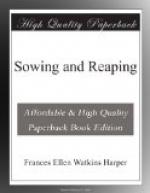Paul Clifford, whom we have also introduced to you, was the only son of a widow, whose young life had been overshadowed by the curse of intemperance. Her husband, a man of splendid abilities and magnificent culture, had fallen a victim to the wine cup. With true womanly devotion she had clung to him in the darkest hours, until death had broken his hold in life, and he was laid away the wreck of his former self in a drunkard’s grave. Gathering up the remains of what had been an ample fortune, she installed herself in an humble and unpretending home in the suburbs of the city of B., and there with loving solicitude she had watched over and superintended the education of her only son. He was a promising boy, full [of?] life and vivacity, having inherited much of the careless joyousness of his father’s temperament; and although he was the light and joy of his home, yet his mother sometimes felt as if her heart was contracting with a spasm of agony, when she remembered that it was through that same geniality of disposition and wonderful fascination of manner, the tempter had woven his meshes for her husband, and that the qualities that made him so desirable at home, made him equally so to his jovial, careless, inexperienced companions. Fearful that the appetite for strong drink might have been transmitted to her child as a fatal legacy of sin, she sedulously endeavored to develop within him self control, feeling that the lack of it is a prolific cause of misery and crime, and she spared no pains to create within his mind a horror of intemperance, and when he was old enough to understand the nature of a vow, she knelt with him in earnest prayer, and pledging him to eternal enmity against everything that would intoxicate, whether fermented or distilled. In the morning she sowed the seed which she hoped would blossom in time, and bear fruit throughout eternity.
Chapter II
The Decision[1]
“I hear Belle,” said Jeanette Roland[2] addressing her cousin Belle Gordon, “that you have refused an excellent offer of marriage.”
“Who said so?”
“Aunt Emma.”




